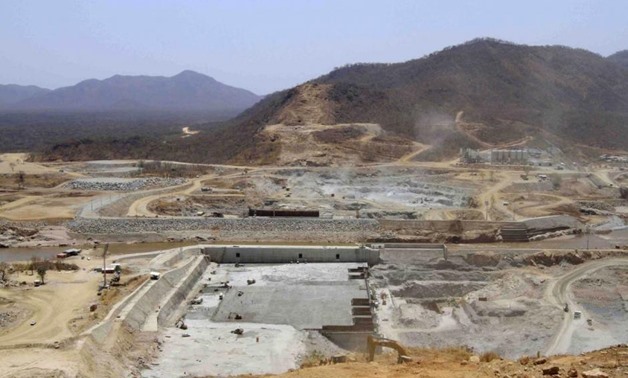
File- FILE- A general view shows construction activity on the Grand Renaissance dam in Guba Woreda, Benishangul Gumuz region in this March 16, 2014 file photo. REUTERS/Tiksa Negeri/Files
CAIRO - 27 June 2020: Although the African Union urgent meeting that held on Friday over the issue of the construction of the Grand Ethiopian Renaissance Dam (GERD) agreed on abstaining from taking any unilateral measure, including filling the dam, before an agreement is reached, Ethiopia has announced on Saturday that it would start filling the dam’s reservoir with water in the coming two weeks, in conjunction with finalizing a binding deal.
“Ethiopia is scheduled to begin filling the GERD within the next two weeks, during which the remaining construction work will continue. It is in this period that the three countries [Egypt, Sudan, and Ethiopia] have agreed to reach a final agreement on few binding matters,” announced the Office of Ethiopian Prime Minister Abiy Ahmed in a statement on Saturday.
Director-General of the Ethiopian Job Creation and Enterprises Development Agency in Benishangul-Gumuz Bashir Abdel-Rahim said that Ethiopia started the cleaning process over 1,000 hectares on Friday, in preparation for filling the dam’s reservoir, reported the Arabic version of the Ethiopian News Agency on Saturday.
Abdel-Rahim added that the filling process is scheduled to start in July [as currently is the rainy season that starts in June to September] and the Ethiopian government has allocated 32 million Ethiopian birrs (about $930,232) for the cleaning process, which could last for less than one month.
On Friday, a virtual mini-summit grouping member states of the Bureau of the African Union Heads of State and Government was held to discuss the issue of the dam. The outcomes that were produced during the meeting included that a technical and legal committee would be formed from a group of experts from Egypt, Sudan, and Ethiopia, with representatives from African countries to finalize a binding deal on the GERD within two weeks ahead of filling the dam with water in mid-July, and to avoid any unilateral action including the dam's filling before finalizing the agreement.
Coincidently, Ethiopia's Minister of Water, Irrigation, and Energy Seleshi Bekele announced that the committee would finalize the GERD agreement within 2 to 3 weeks.
President Abdel Fatah al-Sisi said that Egypt is ready to resume negotiations with Sudan and Ethiopia to reach a fair and balanced agreement on filling and operating GERD.
To ensure successful negotiations, all parties shall pledge not to make any unilateral decisions, as well as halt the dam's filling till reaching an agreement preserving the three countries' interests, Sisi said.
A letter with the AU meeting’s outcomes will be sent to the Security Council, as it is the international body with jurisdiction, in order to take it into consideration when holding a session to discuss the Renaissance Dam issue next Monday, announced Egyptian Presidential Spokesperson Bassam Radi in a statement early Saturday.
Since 2014, Egypt, Ethiopia, and Sudan have entered into negotiations of the building of the dam to avoid any possible threats on the Nile downstream countries [Egypt and Sudan]. The latest round of the talks which convened early June reached a stalemate, ahead of the Ethiopian unilateral act of filling the dam’s reservoir mid-July without reaching a final agreement among the three countries.
Egypt last week decided to request the United Nations Security Council’s intervention in the dispute on Ethiopia’s massive dam after Egypt said several times that the two countries have been deadlocked over the dam.
The difference between Egypt, Sudan, and Ethiopia dates back to May 2011 when Ethiopia started building the dam; Egypt voiced concern over its water share [55.5 billion cubic meters]. Three years later, a series of tripartite talks between the two countries along with Sudan began to reach an agreement while Ethiopia continued the dam construction.
In 2015, the three countries signed the Declaration of Principles, per which the downstream countries should not be negatively affected by the construction of the dam. Since then, the talks have been resumed, but In October 2019 blamed Addis Ababa for hindering a final agreement concerning a technical problem, calling for activating the Article No. 10 of the Declaration of Principles, which stipulates that if the three countries could not find a solution to these differences, they have to ask for mediation.


Comments
Leave a Comment